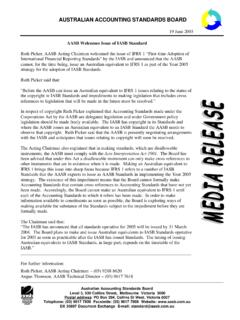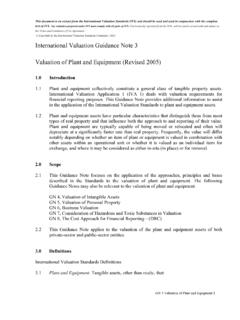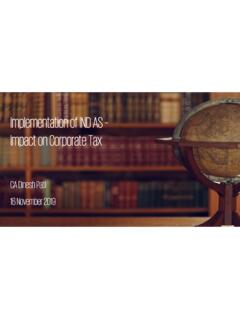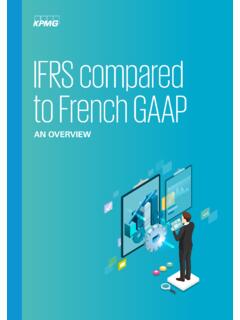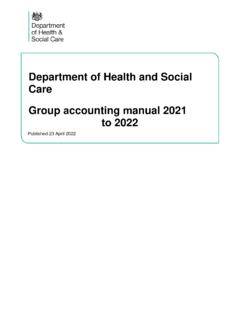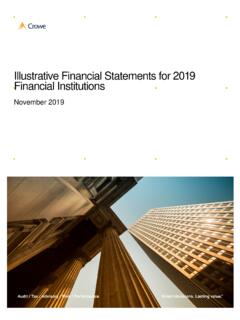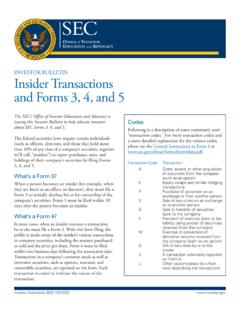Transcription of Japanese GAAP is equivalent to IFRS.
1 Japanese GAAP is equivalent to IFRS. KUROKIPRESENCEJ apan has one of the world's largest equity marketsJapanese issuers play an important rolein Euro marketsMarket value (as of the end of 2003)Most of these bonds are issued in the Euro of bonds issued outside Japan by Japanese resident borrowers (including banks)Source:World Federation of Exchanges3,5003,0002,5002,0001,5001, ( trillion)Source:Ministry of Finance Japan( 1 as of 31 March 2004)Convergence is an important nchenCopenhagenDublinLjubljanagEdinburgh VeneziaMany Japanese issuers are listed onEuropean of listed Japanese issuers (as of 19 January 2004)
2 Stock bond KUROKI24108176 Paris4162455 Frankfurtam Main1780 LUXEMBOURGA ccounting, auditing and disclosure systems in Japan are essentially equivalent to and consistent with internationally recognized is an important goal for all market participants to foster confidence and efficiency in global capital markets. In this context, continued efforts towards this goal will be securities issuers have played an active part in the EU markets. There are approximately 75 Japanese issuers with shares listed and at least 180 issuers with bonds listed within the EU.
3 Financial statements prepared in accordance with Japanese GAAP and audited in accordance with Japanese GAAS have been widely accepted by investors in the EU markets as well as foreign investors in Japanese markets. Given these facts, both the EU markets and Japanese securities issuers will benefit from the continued use of financial statements prepared in accordance with Japanese GAAP and audited in accordance with Japanese the result of above reform, Japanese GAAP is one of the "high quality, internationally recognized accounting standards" mentioned in the G8 Declaration on "Fostering Growth and Promoting a Responsible Market Economy" in June 2003.
4 Now there are few differences between Japanese GAAP and IFRS, except for some relatively minor ones. Financial statements prepared by listed companies in accordance with Japanese GAAP have high comparability for investors with those in accordance with IFRS or US GAAP. Convergence of accounting standards is an important goal, which is common to all market participants in order to foster confidence and efficiency in global capital markets. This goal is shared by the IASB and each national standards setter aiming to achieve convergence of accounting standards.
5 In the context of that goal, great importance should be attached to the process towards convergence of accounting standards. Considering the fact that Japanese securities issuers participate in global business and fund-raising activities using financial statements prepared in accordance with Japanese GAAP, they have strong incentive for the convergence of accounting standards. Convergence process would progress more efficiently by making use of such incentive inherent in market participants.
6 Convergence of accounting standards should progress through selection and judgment by market participants. The accounting standards currently used in global financial markets, such as Japanese GAAP, can play an important role in the convergence process. The accounting Standards Board of Japan ("ASBJ") established in July 2001, has committed continuously to improve Japanese GAAP in line with developments in other major internationally recognized accounting standards including IFRS and US GAAP.
7 As part of this effort, the ASBJ will continue to work together with the IASB to develop high quality accounting standards. Through such process, current differences between Japanese GAAP and IFRS will be the so-called "Financial Big-Bang" since 1996, accounting , auditing and disclosure systems in Japan have been substantially revised and have essentially become equivalent to and consistent with internationally recognized systems. The revisions include, for example,- Revision of Consolidated Financial Statements, Retirement Benefits, accounting for Income Taxes, Fair Value accounting for Financial Instruments, Impairment of Assets, and Business The establishment of the new Auditing Standards including "going concern" and "risk approach.
8 " - The measures to enhance disclosure including risk information, governance-related information and MD&A. accounting , Auditing and Disclosure Systems in JapanInternational Comparison of accounting Standards-Overview of Major Japanese GAAP, IAS/IFRS, and US GAAPA ccounting StandardsFinancial InstrumentsBusiness CombinationsImpairment of AssetsRetirement BenefitsIncome TaxesInvestment PropertyResearch & DevelopmentConsolidated Financial Statements*Consistent treatment :AccountingJapanese auditing systems have also been revised to become equivalent to the international level.
9 To begin with, the Auditing Standards and the Implementation Guidance in Japan ( Japanese GAAS) have become equivalent in substance to and consistent with the International Standards on Auditing ("ISAs") as a result of the establishment of the new Auditing Standards in January 2002, in which emphasis on discovering fraud and the treatments of "going concern" were clearly covered and "risk approach" thoroughly introduced and implemented. Accordingly, if foreign securities issuers are audited in accordance with ISAs, such audit is accepted in addition, in view of the international initiatives to strengthen the auditing regime in line with the Sarbanes-Oxley Act of 2002, the Certified Public Accountants Law ("CPA Law") was revised in May 2003 and will be effective in April 2004.
10 This revision incorporates prohibition of providing certain non-audit services contemporaneously with audit services and requirement of audit partner rotation in order to enhance auditor independence. The CPA Law also incorporates establishing "the CPA and Auditing Oversight Board" ("CPAAOB") in order to enhance auditor these revisions of auditing standards, new independence rules and auditor regulations, financial statements of listed companies which are audited by Japanese audit firms in accordance with Japanese GAAS have the same level of assurance as those audited in accordance with ISAs.

